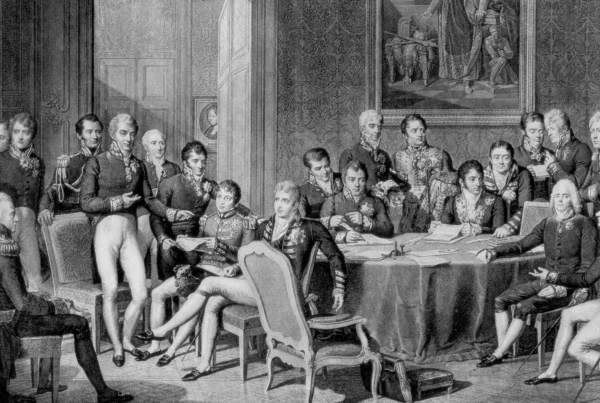The question of what binds human societies has intrigued thinkers and historians for centuries. If humankind is, as often posited, a species motivated by self-interest, how can communities of individuals—each driven by personal ambition—flourish or even endure? This inquiry was compellingly addressed by the 14th-century Abdul Rahman Ibn Khaldun, a pioneering Muslim Arab historian, economist, and sociologist. His enduring insights into social cohesion or Asabiyyah remain remarkably relevant today, standing in stark contrast to the individualistic ethos often celebrated in Western societies.
Aly Mahmoud
21 August 2024
Chinese version | Spanish version
Ibn Khaldun’s extensive travels across the Maghreb—encompassing Morocco, Granada, Tunisia, and Cairo—provided him with a diverse perspective on human dynamics. During his time, he served in various roles, including judge, statesman, and diplomat. His seminal work, Kitab al-Ibar, particularly its introduction, Muqaddimah (Arabic for Prolegomena), has become a classic and is considered a founding document for various fields of human enquiry, especially the social sciences. A key element of Ibn Khaldun’s work is the group, not the individual, which was history’s focal point and determining factor. This perspective stands in contrast to the individual-centric or Id- focus of the West especially since the Renaissance of the 14th and 15th centuries.
Ibn Khaldun regarded humans as inherently domineering and competitive, driven by a desire for power that frequently results in conflict. He characterized individuals as “savage, stupid, weak, and ignorant,” which prompted him to explore how these egoistic tendencies could transform into cohesive societies. His answer lies in the concept of Asabiyyah.
The concept of Asabiyyah, which derives from the Arabic root “Asab,” meaning “to bind” or “to unite”, gained prominence through Ibn Khaldun’s work and has been interpreted by scholars in various ways. While it is often equated with social cohesion, esprit de corps, solidarity, or even nationalism, such comparisons can be misleading. Unlike the rigid frameworks associated with patriotism or absolute nationalism, Asabiyyah emerges as a multifaceted and dynamic force. It embodies mutual support, respect, and a collective commitment to social welfare, encapsulating the essence of community life—or social connectedness. It is important to note that Ibn Khaldun’s concept of Asabiyyah is not based on biology or ethnicity but rather on functional unity.
In his writings, Ibn Khaldun explains that when a group has few blood ties, there develops a natural sense of unity called “Asabiyyah.” However, as the group grows and blood ties become more diluted, the sense of unity becomes more of an illusion. According to Ibn Khaldun, it is not the actual blood ties that are important but the belief in them and the resulting sense of closeness and mutual support.
Khaldun examined the dynamics of group relationships and demonstrated how group sentiments contribute to the rise of new civilizations and political authority, only to weaken over time. He formulated a cyclical theory based on Asabiyyah—associated with a fervor found among those living on the fringes of major civilizations. These groups, endowed with a strength and vigor that often transcended their numerical size, were able to conquer more advanced and affluent cities. However, the victors eventually succumbed to the comforts of civilization, rendering them vulnerable to subsequent conquests by groups having a stronger Asabiyyah.
Khaldun asserts that “Human beings need someone to act as a restraining influence and mediator in every social organization to keep members from fighting with each other.” This mediator must possess a degree of superiority in Asabiyyah, an authority that correlates with political power. While military strength may establish royal authority, it is Asabiyyah that acts as the essential bond uniting societies, proving to be more potent in tribal settings than in urban environments.
Effective leadership plays a crucial role in nurturing and sustaining Asabiyyah. A respected leader who embodies the community’s shared values can cultivate loyalty and obedience by aligning leadership with societal aspirations. Moreover, common goals, shared experiences, and collective norms further enhance the sense of Asabiyyah. Ibn Khaldun further explains that when individuals perceive their struggles as serving the interests of a distant king, external clan, or abstraction rather than their own community, Asabiyyah weakens, thus jeopardizing the community’s stability.
Ibn Khaldun believed that there were a number of factors that could lead to the loss of Asabiyyah. One factor is the increase in wealth and luxury which often diminishes the necessity for collective action, redirecting individuals towards personal gain at the expense of communal welfare—a phenomenon increasingly observable today as economic disparities widen. The affluent may withdraw from social responsibilities, leaving vulnerable populations to confront rising hardships alone. Morally, luxury proves destructive, luring individuals to prioritize material comfort over ethical considerations. Such cultural shifts fuel dishonesty and selfishness, ultimately diminishing Asabiyyah and rendering societies vulnerable to external threats as individualism and factionalism eclipse collective strength.
Additionally, Ibn Khaldun cautions that political corruption as well as the rise of fanaticism can fracture societies into competing factions, undermining solidarity. When a society’s sense of Asabiyyah weakens, it becomes susceptible to divisive rhetoric and unstable identities, leading to a departure from collective aspirations. Khaldun’s assertion that effective leadership relies on maintaining Asabiyyah underscores the need for leaders to diligently work to unite communities and address the erosion of trust.
Over time, complacency can permeate societies that have grown accustomed to ease and comfort. The resilience and toughness essential for confronting challenges may diminish, especially in younger generations who may not have experienced adversity. This risk underscores the necessity for communities to cultivate resilience and adaptability, promoting a culture where individuals feel a shared stake in the success of the collective.
As societies navigate the complexities of modern life—marked by fragmentation and distrust—Khaldun’s insights urge us to reconnect with the spirit of Asabiyyah. Emphasizing collective identity and mutual support can help counteract the isolating effects of extreme individualism prevalent today.
Although Ibn Khaldun’s observations were rooted in the Arab societies of his time, the principles he elucidated regarding Asabiyyah resonate profoundly in today’s world. His insights underscore that group solidarity and social connectedness are fundamental for the rise and fall of civilizations, and for contemporary discussions on social cohesion and community resilience. By embracing the lessons of Asabiyyah, societies can address challenges collectively, reinforcing the belief that true strength is found not in self-interest but in the bonds forged with communities.
Asabiyyah’s timeless wisdom serves as a crucial guide for navigating the divisive factions of modern life, emphasizing that community solidarity is indispensable for confronting both external threats and internal divisions. In a world dominated by fragmented narratives and extreme interpretations of individualism, understanding the importance of empathy and cooperative engagement becomes essential. Revitalizing Asabiyyah supports those who unite against corruption and injustice while transforming personal interests into collective demands for change to achieve the social responsibility and connectedness of Asabiyyah.
Picture: Ibn Khaldoun Statue at the entrance of El Kasbah (9.5.2022) © IMAGO / Depositphotos and dome and minarets of Ibn Khaldun Mosque in Alexandria, Egypt (17.11.2022) © IMAGO / UIG
Other Articles Which Might Interest You
The Age of Loneliness and Loss of Social Connectedness







